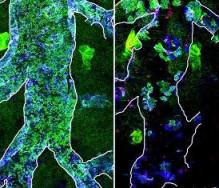 Lung-TumorZym (LT-Zym) contains an “adaptogenic” mixture of HerbalZym compounds. Our proprietary blend of bioactive ingredients is what makes LT-Zym so unique and effective. The active LT-Zym ingredients aims to control, inhibit and destroy lung cancer cells. It is functioning as signal transduction inhibitors, which work by blocking the signals that make cancer cells survive, grow, divide and spread. Simply stated, we have developed the right combination of ingredients for the treatment of lung cancer.
Lung-TumorZym (LT-Zym) contains an “adaptogenic” mixture of HerbalZym compounds. Our proprietary blend of bioactive ingredients is what makes LT-Zym so unique and effective. The active LT-Zym ingredients aims to control, inhibit and destroy lung cancer cells. It is functioning as signal transduction inhibitors, which work by blocking the signals that make cancer cells survive, grow, divide and spread. Simply stated, we have developed the right combination of ingredients for the treatment of lung cancer.
The greatest benefits to using a combination of HerbalZym ingredients in treating lung cancer are the synergy created by those ingredients working in concert, and accelerated results. Over the past 10 years, extensive research and clinical experimentation have proven that LT-Zym is amazingly effective. This has now been proven over and over again. You will get surprised changes in your body in 4-8 weeks. LT-Zym is the only natural medicine in the world that will help people with advanced lung cancer to cure.
Lung cancer is particularly difficult to treat and is the leading cause of cancer death worldwide, killing an estimated 1.31 million people a year. Patients with advanced disease have few treatment options and about 70% of them die within one year of diagnosis. Fewer than two percent survive five years.
There are two main types of lung cancer that have different microscopic appearances:
You and your doctor choose a cancer treatment regimen based on a number of factors, such as your overall health, the type and stage of your cancer, and your preferences. Options typically include one or more treatments, including surgery, chemotherapy, radiation therapy or targeted drug therapy. Small-cell lung cancer is rarely treated with surgery, because usually by the time the disease is diagnosed the cancer has already spread.
Most patients with lung cancer will receive chemotherapy at some point in their care, since that form of the disease almost always spreads beyond the lung via the bloodstream. A number of targeted drug therapies including an antifolate drug can be used alone or in combination with chemotherapy to treat lung cancer and prevent its recurrence. Because these drugs work in a different way than chemotherapy, they do not cause side effects such as hair loss and nausea. Antifolate drugs interfere with a cancer cell’s consumption of folic acid, which is essential for cell growth and division.
Most chemotherapy regimens use platinum compounds, either cisplatin (Platinol) or carboplatin (Paraplatin). The preferred regimen uses two drugs — one of which is a platinum-based drug. Combinations may include paclitaxel (Taxol) and carboplatin or cisplatin. This regimen can also include gemcitabine, docetaxel, or vinblastine (vindesine or vinorelbine). There do not seem to be any significant differences in effectiveness among these regimens. The gemcitabine and vinorelbine combination might be an option for patients who cannot tolerate platinum compounds.
Chemotherapy for lung cancer may have reached its peak. Still, investigative chemotherapeutic drugs may yet improve response. Many experts are pinning their hope on agents called biologic response modifiers, such as gefitinib (Iressa). To date, however, they have not achieved better results than standard platinum-based chemotherapies. Gefitinib (Iressa), a second-line therapy for non-small cell lung cancer, is now available only for a limited group of patients. These patients have benefited from gefitinib in the past, or they are enrolled in a clinical study with the drug. While this medicine initially showed promise in clinical trials, results from a newer study failed to show that it prolonged survival in advanced lung cancer patients who failed other treatments.
Erlotinib (Tarceva) is in the same medication class as gefitinib. It is approved for patients with locally advanced or metastatic non-small cell lung cancer who have failed one type of chemotherapy treatment in the past (it is a second-line treatment). Unlike gefitinib, erlotinib shows survival and progression-free benefits compared to placebo. However, it should not be combined with platinum-based chemotherapy.
Pemetrexed (Alimta). Pemetrexed, known as an anti-folate, is a new drug for first-line treatment of advanced nonsquamous non-small cell lung cancer, in combination with cisplatin. The drug targets a number of enzymes that play a role in how cancer cells increase. Pemetrexed does have some serious toxic effects, but they can be significantly reduced with folic acid and vitamin B12 supplements.
Unfortunately, resistance can develop and present a major obstacle to further effective treatment. Many intracellular events contribute to drug resistance. The drug target may be mutated or amplified. Intracellular levels of the drug may be decreased due to impeded entry into the cell or active ejection from the cell. In the latter case, multi-drug resistance (MDR) often results from increased expression of ATP-binding cassette (ABC) transporter proteins that cause the efflux of various anticancer drugs from the cancer cell. The most widely studied of these is linked to a broad spectrum, ATP-dependent drug, efflux pump identified as P-glycoprotein (P-gp). Pgp is encoded by the MDR1 (ABCB1) gene that has become a major target of strategies to reverse resistance.
 LT-Zym is much more effective than your typical cancer fighting supplements or medications. If someone is in a very bad state, in the end stage of their battle, use LT-Zym. LT-Zym can be used alone or in combination with chemotherapy drug or targeted drug . In particular, LT-Zym and Pemetrexed (Alimta) combination has proved amazingly effective and well tolerated in patients with advanced non small cell lung cancer (NSCLC). All patients with advanced lung cancer (NSCLC) in the clinical trials experienced dramatic tumor shrinkage from 60% – 100% after 4 weeks of treatment with LT-Zym and Pemetrexed (Alimta) combination therapy. This has now been proven over and over again, regardless of which chemotherapy drug cocktail is used. LT-Zym is the only product in the world that has perfect solubility/bioavailability of the most effective herbal compounds enough to induce apoptosis of lung cancer cells. LT-Zym is synergistic with GenisZym and BroccoZym against lung cancer, which are sustainable, and uncomparable to any other therapy for lung cancer, and this could become the gold standard therapy. LT-Zym is the most effective treatment option for lung cancer.
LT-Zym is much more effective than your typical cancer fighting supplements or medications. If someone is in a very bad state, in the end stage of their battle, use LT-Zym. LT-Zym can be used alone or in combination with chemotherapy drug or targeted drug . In particular, LT-Zym and Pemetrexed (Alimta) combination has proved amazingly effective and well tolerated in patients with advanced non small cell lung cancer (NSCLC). All patients with advanced lung cancer (NSCLC) in the clinical trials experienced dramatic tumor shrinkage from 60% – 100% after 4 weeks of treatment with LT-Zym and Pemetrexed (Alimta) combination therapy. This has now been proven over and over again, regardless of which chemotherapy drug cocktail is used. LT-Zym is the only product in the world that has perfect solubility/bioavailability of the most effective herbal compounds enough to induce apoptosis of lung cancer cells. LT-Zym is synergistic with GenisZym and BroccoZym against lung cancer, which are sustainable, and uncomparable to any other therapy for lung cancer, and this could become the gold standard therapy. LT-Zym is the most effective treatment option for lung cancer.